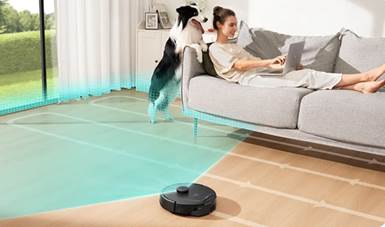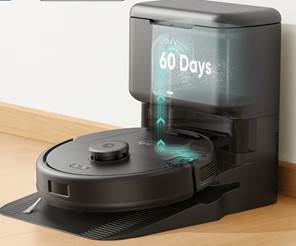Shopping for a robot vacuum
for the first time can be stressful. With so many brands, features, and pricing
ranges, it's easy to become lost in the specifics. This tutorial explains
everything novices should know before buying. From important features to
matching your floors and comprehending smart capabilities, we'll help you make
an informed decision. You'll also learn how to avoid frequent traps and keep
your equipment in optimal condition. If you want to locate the best robot
vacuum without wasting time or money, this checklist will guide you from the
start.

What Should Beginners Look for in a Robot Vacuum?
Must-Have Features for First-Time Users
Beginning cleaners should embrace features that make
cleaning easier without adding complexity. Look for scheduling, auto docking,
and powerful suction. Cliff sensors prevent stair falls, and bump sensors
safeguard the furniture. The vacuum's long-lasting batteries allow it to clean
without needing to recharge. HEPA filters benefit allergy sufferers. Compact
models fit best beneath the furniture. Basic app control or a manual remote are
effective. If advanced mapping is tough, beginners should avoid it. Before
spending on high-end features you may not need, try a reliable, user-friendly
model first.
How to Match Robot Vacuums with Floor Types
Selecting the best robot vacuum depends on the sort of
floor you have. Most robot vacuums, including low-cost versions, work well on
tile and hardwood floors. More suction and a wider brush roll are required if
you have high-pile carpets or thick rugs. Mid-range models look good with
low-pile carpets. Devices with auto surface identification or height adjustment
should be considered for homes with mixed flooring. You need a tangle-free
brush for pet hair on carpets. If you have rugs over hard flooring, stay away
from models that can't climb. Selecting the appropriate vacuum guarantees
regular cleaning without becoming clogged or overlooking areas.
Comparing Smart Features: Wi-Fi, Apps, and Voice
Control
Some smart features are useful but not necessary. Even
when you're away, Wi-Fi allows you to schedule and control your network using
smartphone apps. App access displays cleaning maps, battery life, and
maintenance alerts. Voice control with Alexa or Google Assistant is useful when
you have both hands full. Smart features may confuse newcomers, so consider
simpler interfaces. The eufy L60 with Self-Empty Station is an excellent choice
for user-friendly technology and automation. It offers simple navigation and
self-emptying capabilities without being overly complicated. Smart features
should simplify rather than overwhelm new users with options.

Are All Robot Vacuums Easy to Use and Maintain?
Setup and Navigation: What to Expect
Most robot vacuums come pre-assembled and require only
a few simple setup procedures. Place the charging dock outside, turn on the
device, and press Start. Some models require approximately five minutes to
complete the app setup. Budget models move randomly, whereas luxury models map
your home. First-time runs will be challenging while the robot learns your
configuration. First, scrub the floors of wires and small objects. Beginners
underestimate how quickly these machines adapt. Early recognition of your robot's
pattern fosters trust and streamlines daily operations.
Maintenance Tips to Keep It Running Smooth
Basic maintenance ensures that your robot vacuum works
like new. Clean the filters weekly and empty the garbage after each usage.
Brushes and filters should be replaced every 2-3 months, depending on their
usage. Wipe down the sensors and charging contacts with a moist cloth. Check
the wheels for hair buildup and carefully remove it. Keep the charging dock
area clean to avoid problems. If the robot becomes stuck frequently, rearrange
furniture or block off problem areas. Regular software updates also boost performance.
Following these easy routines protects against wear, provides powerful suction,
and extends the life of even the greatest robot vacuum on the market.
Common Beginner Mistakes and How to Avoid Them
Many first-time users let their robot vacuum run
without cleaning their surroundings. Low-hanging textiles, stockings, and cords
might catch wheel or jam brushes. Ignoring consistent bin emptying rapidly
lowers suction power. Ignoring brush and filter maintenance reduces
performance. For big areas, depending just on random-cleaning algorithms can
result in missing places. Some consumers set up smart features but never
utilize them, therefore missing their advantages. Reading the handbook, getting
your house ready, and creating a weekly maintenance reminder will help you
avoid these blunders. Your robot vacuum will run consistently and save you many
hours of weekly manual cleaning with these easy routines.
Conclusion
Don't strain to choose your first robot vacuum. First,
consider qualities that are appropriate for your lifestyle and available space.
Key features include ease of use, dependable cleaning, and a maintenance plan
that works around your schedule. Understanding your floor type and utilizing
smart features can enhance your experience without complicating it. Avoid
fundamental blunders, and your robot will become a household fixture. For
those still exploring the best robot vacuum, use this checklist as your foundation.
With the right preparation and realistic expectations, even a first-time buyer
can make a smart, satisfying purchase decision.
